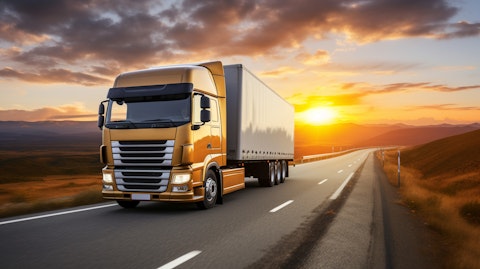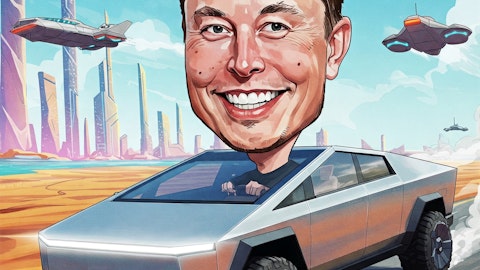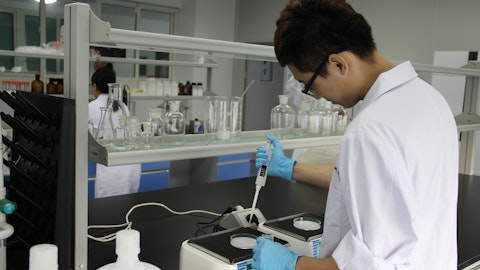Workhorse Group Inc. (NASDAQ:WKHS) Q1 2025 Earnings Call Transcript May 15, 2025
Operator: Greetings and welcome to the Workhorse Group Q1 2025 Earnings Conference Call and Webcast. At this time, all participants are in a listen-only mode. [Operator Instructions] A question-and-answer session will follow the formal presentation. [Operator Instructions] As a reminder, this conference is being recorded. It’s now my pleasure to turn the call over to Stan March. Please go ahead, Stan.
Stan March: Thank you very much, Kevin. Good morning. We’d like to welcome all of you to Workhorse’s Q1 2025 results call. Before we begin, I’d like to note that we posted our results for the first quarter, which ended March 31st, 2025, via press release this morning, and you can find the press release and an accompanying investor presentation that will form the basis of today’s call in the Investor Relations section of our website. We’ll be tracking along with the presentation during the call. Joining me on today’s call are Rick Dauch, our CEO; and Bob Ginnan, our CFO. For today’s agenda, please turn to Slide 3. Following my opening comments, I’ll hand the call over to Rick, who’ll give an update on our strategic and operational priorities and deliverables during Q1.

Bob will then walk us through our financial results before discussing our continued actions to preserve cash and extend our financial runway. Then Rick will wrap it up before we open the call to questions. Turning to Slide 4, you can find our disclaimer. Some of the comments that will be made on this call today are forward-looking and are subject to certain provisions and are also subject to risks and uncertainties. You can find the full disclaimer in our periodic SEC filings as well as today’s release. With that behind us, I’d like to now turn the call over to Rick Dauch. Rick?
Rick Dauch: Thanks, Stan. Good morning, everybody. As we wrap up the first quarter of 2025, customer demand in the commercial EV market continues to shift. But our direction here at Workhorse has never been more focused to design and build dependable, capable electric trucks, prove they perform in the field and win business by earning our customers’ confidence and their purchase orders. As some competitors are finding out that doesn’t happen through PowerPoint decks or prototype factories. It takes real hardcore execution to include rigorous design, engineering and testing, strong partnerships with proven commercial vehicle industry suppliers, upfitters, dealers and service partners. And it takes a dedicated talented workforce that shows up and gets the job done every day.
This quarter we continue to execute on our strategy of focusing on our people, our products, our processes and our partners. Midway through the second quarter, interest in our vehicles is accelerating and momentum is building where it counts through vehicle orders, real world fleet customer deployments and steady progress along our product technology roadmap. Most importantly, the W56 is earning a strong reputation among early adopters as the best commercial EV step van on the market. Those aren’t our words, it’s direct feedback from several customers who are operating Workhorse trucks in the field as we speak. While others are still testing products are talking about building future factories, we’re delivering zero tailpipe emission trucks that are on the road and on the job.
Q&A Session
Follow Workhorse Group Inc. (NASDAQ:WKHS)
Follow Workhorse Group Inc. (NASDAQ:WKHS)
Receive real-time insider trading and news alerts
Fleets are putting our vehicles to work on last mile delivery routes where performance matters. They’re cutting operating costs, meeting range requirements and earning the trust of the drivers and fleet managers who rely on our trucks every day. That’s how we will win additional business and that’s how we’ll continue to grow with results not rhetoric. So let’s talk about the results and let’s move to Slide 5. Year-to-date, we booked purchase orders for a total of 27 W56 step vans covering both the 178-inch and 208-inch wheelbase models. These structure are on track for delivery to the next 60 to 120 days. This does not include the first W56 order from Gateway Fleets for deployment across their vehicle network. Gateway Fleets provides electric vehicle leasing and charging-as-a-service solutions for last mile delivery operators.
They offer flexible, no CapEx financing models and turnkey depot deployment to help fleet operators lower operating costs and scale efficiently. This initial order lays the foundation for what we believe will grow into a long-term partnership as Gateway expands its presence and supports more independent contractors and routes across the country. It’s an important new relationship for Workhorse and we’re proud to share the news with you on this earnings call. Beyond these new orders, we delivered FedEx’s 2024 order of fully equipped 178-inche wheelbase W56 step vans. These vehicles were equipped by our upfit partner Utilimaster and built-to-meet FedEx exact operational requirements. They are expected to be deployed by FedEx at three terminals by the end of Q2, bringing the total number of FedEx terminals with W56 step vans up to 12 and growing.
Our ongoing engagement with FedEx continues through both high level meetings in Memphis and Pittsburgh and through active vehicle demos and purchase orders with independent ground contractors across the country. We anticipate receiving the 2025 RFQ from FedEx corporate purchasing in Q2, which we verified this week. Meanwhile, beyond FedEx, we have multiple active W56 demos underway with logistics providers and service fleets. These efforts are not only focused on building a backlog of orders, but also on validating product performance in real world conditions. Just weeks ago, we began delivering the extended wheelbase 208-inch wheelbase step van to a national fleet through our partner Revolv. This new model with 1,200 cubic feet of cargo space is giving fleet operators a larger Class 5/6 electric alternative without range or payload compromise.
This order is for 13 W56 units. Finally, we continue to expand the adoption of our W4 CC electric work trucks. Recently, a municipality in Washington State purchased vehicles to facilitate through our Sourcewell contract by our certified dealer, The Truck Shop. These W4 CCs will be used for recycling and trash bin service. Another clear example of electric commercial trucks proving their value in practical daily fleet operations. We continue to grow our dealer and service networks and government channel to meet rising demand. This quarter, we added two new Ziegler Company dealers, Range Truck Group in Washington and the third Ziegler Truck Group location in Wisconsin. These additions strengthen our market coverage in key states preparing to adopt CARB emission standards.
We also expanded our certified service network adding two new partners in key metro markets, J&S Truck Repair covering the San Francisco Bay Area and Gerber RV serving the Hackensack, New Jersey, New York City and broader New York Metro Area. These partners are helping us ensure fast, reliable service where our customers need it most. In the public sector, Kingsburg Truck Center was awarded a California Department of General Services contract for both our W4 CC and our W56 vehicles. This streamlines the procurement process for state agencies and gives government buyers easier access to our trucks. We also received CMVSS certification and approval for the import and sale of W56 and W750 vehicles into Canada, broadening our international footprint and unlocking new opportunities up there.
And we have lined up a large well known fleet up there for demos later in the quarter. In the face of ongoing market challenges and dynamics, many of them outside of our control, we remain focused on maintaining financial discipline. In Q1, we successfully reduced operating expenses by $9.3 million on a year-over-year basis. Cash preservation and capital discipline continue to be priorities as we navigate the complexity of the fleet adoption delays, shifting government incentives and mandates and gas and charging infrastructure across the country. We are working diligently to keep Workhorse on a financially viable path forward until a few commercial and state funded fleets place larger orders. We believe we have a superior product in W56 step van built 100% in our world class Union City, Indiana plant with an experienced chassis builder team.
In March, we completed a reverse stock split that brought us back into NASDAQ compliance, an important milestone that helps support our long-term plans and near-term access to capital. In addition, we continue to work with ATW on near-term funding needs. While these actions are dilutive to shareholders, they are buying us the necessary time to earn the type of larger fleet orders that we need in order to go out and secure additional long-term funding to finance the company. Move to Slide six. Workhorse is the only North American OEM producing complete electric step vans in-house, body and chassis under one roof. That capability gives us greater control over quality, lead times and customization. It allows us to move faster and respond more effectively to customer needs.
It’s a key differentiator in a market where many other step van competitors rely 100% on third-party manufacturing. At Workhorse, we’re not just building electric truck, we’re building a full scale product portfolio for the demands of last mile delivery across the Class 4 to 6 segment of work trucks. That’s why we’re expanding the W56 lineup to give fleet operators more of what they need, more range options, more cargo capacity and more flexibility configure the vehicle around the world job requirements they have in the field. Today we have six Class 4 to 6 electric models in production with four more variants in development to support a wide range of fleet use cases. That includes our extended wheelbase 208 W56 now fully certified in both the US and Canada, which was durably tested out to 250,000 miles.
It’s in production and already being delivered to customers. We’re also preparing to start production this year on a 140 kilowatt model designed for fleets with lower daily mileage requirements. This version offers a more affordable upfront cost while helping customers lower their total cost of ownership over time. In March, we integrated Geotab’s industry leading telematics into the W56, putting advanced technology into the hands of our fleet operators. With more than 3.5 million connected vehicles worldwide, Geotab is one of the most widely adopted telematics platforms in commercial transportation. And now it’s available on every W56 supporting better operating and business decisions, optimized routes and real world efficiency gains. Vehicles and technology are just part of the Workhorse platform.
We also partner with more than 30 certified upfitters nationwide including Utilimaster, Knapheide, and Switch-N-Go. These relationships allow us to deliver tailored solutions for parcel, service and municipal fleets. Coupled with our in-house cabin body manufacturing and painting capabilities at Union City, it gives us a significant competitive advantage in terms of providing three to six months shorter lead times from PO to delivery to customers versus our competitors. When a customer puts a Workhorse vehicle on the road, they’re not done, not going it alone, because we understand what matters most to fleet operator’s reliability, serviceability and uptime. That’s why we’re actively expanding our national dealer service and support networks to ensure our customers get the attention and parts they need wherever they are.
Whether it’s a dealer for purchase, a service center for maintenance or support for ongoing fleet needs, we’re making sure we’re there for every mile. Our 24 months of experience operating stables by Workhorse as a FedEx ground contractor has provided us with critical lessons learned in the field. Fleet owners make money when their trucks are out doing business that’s why they’re called Work Trucks. And during the recent peak season, the W56 step vans proved themselves in real world conditions achieving 96% uptime across diverse routes, regional terrain and winter weather. According to our customers, that is by far the best uptime record of anybody in the commercial EV segment. Moving to Slide 7. To demonstrate just how reliable the W56 is in the field, in April, we completed a 2,400 mile cross country trip driving the van from Ohio to California.
This is our second long distance journey following a 900 mile route to Orlando last fall. We crossed nine states, tackled multiple charging networks, drove through challenging terrain and weather, all without missing a beat. The W56 consistently delivered 27 miles per gallon equivalent at highway speeds, nearly three times the fuel efficiency of an ICE step van. When you combine that with 53% lower fuel costs and 40% lower scheduled maintenance, the total cost of ownership and advantage of the W56 becomes crystal clear. Through telematics, we tracked every mile of performance data and validate our 150 plus mile range even at highway speeds with over 2,000 pounds of payload and little opportunity for regen. These are the numbers that matter to fleet managers and they have reinforced what we’re building here at Workhorse, trucks that are durable, reliable and operationally ready from day one.
We wrapped up our journey by showcasing the W56 and the Ride & Drive with the ACT Expo in Anaheim, where it drew strong attention from fleet buyers, partners and industry leaders looking for EVs that deliver beyond the spec sheet and can be counted on to do the job every day. Slide 8, the commercial EV landscape continues to change with a few more competitors disappearing in the last 90 days. The difference between promise and production is widening. Some manufacturers are just beginning early customer deliveries and we’re already hearing chatter about quality concerns and product returns. Others are showing vehicles at trade shows, but can’t yet support hands on demos or reliable fleet deployments. Some are still talking about building plants for volume production.
In contrast, Workhorse is building and delivering proven electric trucks that are on the road in service and generating results for fleets. Our products are certified, production ready and backed by a growing network of trusted dealers and service partners. We’re not scaling from scratch. We’ve already built the necessary infrastructure, earned customer trust and demonstrated reliability in the field. That’s what separates Workhorse. In a space full of first tries and future plans, we’re offering a no compromise EV solution that’s working right now and customers are taking notice. I’ve said it before and it’s still true. We don’t build hype, we build trucks. And the value of our offering is resonating with customers. From large fleet customers to municipalities to independent service providers, buyers are telling us they want real EV solutions that work on their terms.
That’s exactly what we’re delivering. We know the road ahead isn’t without its challenges, but we have the right people, the right products and the right partners in place. We’re proud of the momentum we’re building and confident in our ability to scale Workhorse for the long-term. Let me hand the call over to Bob to cover the financial results and cost actions.
Bob Ginnan: Thanks, Rick. Let’s turn to Slide 9 to cover the first quarter results. As a reminder, our financial statements have been adjusted for the March 2025 1-to-12.5 reverse stock split. Sales, net of returns and allowances for the first quarter of 2025 were $600,000 compared to $1.3 million in the first quarter of last year. The $700,000 decrease in sales was primarily due to the Aero divestiture and decreased W4 CC and W56 truck sales. Cost of sales for the first quarter of 2025 was $5.2 million a decrease of $2.3 million compared to $7.4 million in the prior year. The cost of sales decrease was primarily driven by lower sales volume, which were partially offset by lower inventory reserves of $500,000 and lower direct and indirect labor costs of $1.6 million primarily due to lower headcount as a result of employee furloughs during the period.
Selling, general and administrative expense in the first quarter of 2025were $6.8 million a decrease of $7.3 million compared to $14.1 million in the prior year. The decrease in SG&A expense was primarily driven by a $4.4 million decrease in employee compensation and related expenses, primarily due to lower headcount, a decrease of $1 million in consulting expenses, a decrease in legal and professional expenses of $700,000, a decrease of $500,000 in marketing expense, a decrease in IT related expenses of $500,000 and lower corporate insurance of $500,000. These were all partially offset by increases in rent and depreciation and amortization expenses. Research and development expenses during the first quarter of 2025 were $1.5 million, a decrease of $2 million compared to $3.5 million in the prior year.
The decrease in R&D expenses were primarily driven by $1.3 million decrease in employee compensation related expenses due to lower headcount and a $400,000 decrease in consulting expenses. Interest expense net for the first quarter of 2025was $5.3 million compared to $1.3 million in the prior year. The increase was primarily driven by recognition of interest expense related to higher outstanding convertible note balances. During the three months ended March 31st, 2025, the institutional investor converted to $5.9 million of principal into common stock, and the company recorded a $2.9 million fair value net loss in interest expense. Future fair value adjustments attributed to change in credit risk will be recorded in other comprehensive loss.
As of March 31st, 2025, the estimated fair value of outstanding warrants totaled $5.1 million. During the three months ended March 31st, 2025 and 2024, the company recorded a $3.3 million fair value gain and a $500,000 fair value net loss respectively. As of March 31st, 2025, the company had $2.6 million of cash and cash equivalents and $27.9 million in restricted cash, accounts receivable of $27,000, other receivables of $100,000, inventory net of reserves of $41.3 million and accounts payable of $11.1 million. On Slide 10, you can find our balance sheet. As of March 31st, 2025, the company had total working capital of $13.7 million including $2.9 million of cash and cash equivalents, net accounts receivable of $500,000, other receivables of $500,000, inventory net of reserves of $41.8 million and accounts payable of $11.5 million.
During Q1, we spent about $118,000 on capital expenditures, and we expect that same level of spending to carry into the second quarter. Now let’s turn to Slide 11, discuss our financial runway. We recognized the importance of strengthening our balance sheet and took significant cost reduction actions throughout ’24 and into 2025. We reduced monthly operating cash to below $3 million a month, which is materially lower than we were at a year ago. And you can readily see the results in the income statement. We reduced operating costs by $9.3 million compared to Q1 2024. As we look ahead, we will continue to focus on seeking additional opportunities to reduce costs, increase cash and ensure we have the financial runway to achieve our strategic goals.
Just a reminder, given the level of uncertainty in the EV landscape right now, we intend to report on progress when it occurs. As a result and consistent with our last call, we will not be providing specific annual revenue guidance at this time. However, as of today, we have shipped 18 trucks so far in the second quarter, as Rick mentioned, and we aim to have more trucks shipped in the second quarter than we did all of last year. We are beginning to see an increase in sales momentum, and it’s turning. And with that, let me turn the call back over to Rick.
Rick Dauch: Thanks, Bob. As we look ahead, our focus remains on disciplined execution and real world impact. In the near-term, that means building and shipping key customer orders, continuing to earn fleet through trust through demos and securing the next round of purchase orders, including FedEx’s 2025 PO number two. We’re also supporting our dealer network as they drive adoptions across both private and government channels, while strategically showing up at trade shows that align with our mission. Operation, we’re ramping production in step with demand, finalizing testing of our 140 kilowatt W56 variant and assessing new North American battery suppliers to further strengthen our supply chain. At the same time, we’re maintaining a lean operating environment, converting inventory to revenue and pursuing additional funding to position Workhorse for long-term growth.
In short, we’re staying focused, moving with intention and scaling smart, turning proven products and customer traction into lasting momentum in the commercial EV market. Thank you for your support and your patience. And Kevin I’ll turn it back over to you for questions. Thank you.
Operator: Certainly. We’ll now be conducting a question-and-answer session. [Operator Instructions] We’ve reached the end of our question-and-answer session. I’d like to turn the floor back over for any further or closing comments.
Rick Dauch: No further comments. We appreciate your support. We appreciate your patience. And we’re going to put our nose to the grindstone and keep trying to build and sell trucks. Thanks and have a great day. Bye.
Operator: Thank you. That does conclude today’s teleconference and webcast. You may disconnect your lines at this time and have a wonderful day. We thank you for your participation today.
End of Q&A:
Follow Workhorse Group Inc. (NASDAQ:WKHS)
Follow Workhorse Group Inc. (NASDAQ:WKHS)
Receive real-time insider trading and news alerts





